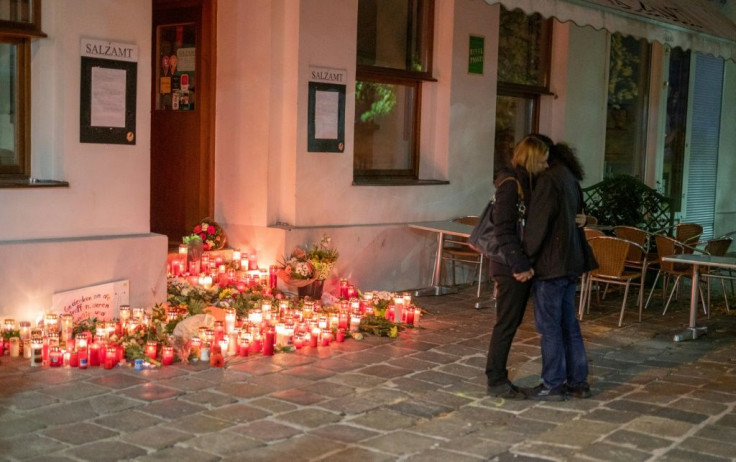Austria Attack Highlights Europe's Jihadist Dilemma
The fallout from last November's shootings on the streets of Vienna has shone a light on Europe's dilemma in dealing with jihadists, particularly the continent's struggles to deradicalise such individuals.
An Austrian court had in 2019 already convicted Kujtim Fejzulai, the 20-year-old gunman, of trying to travel to Syria and join the so-called Islamic State (IS) group.
A condition of his early release from prison was that he attend regular sessions with an organisation called DERAD, which offers deradicalisation programmes.
But on November 2, Fejzulai went on a shooting spree in the streets of Vienna, killing four people before police shot him dead.
When jihadists are freed, "they return to their old circle of friends, where they are considered heroes and they fall back into a negative spiral", Moussa Al-Hassan Diaw, co-founder of DERAD, told AFP.
In its regular reports to the interior ministry DERAD had described Fejzulai as "still radicalised".
But the interior ministry failed to act on a warning from the Slovakian intelligence services that he had attempted to buy ammunition there.
DERAD and the justice ministry were also not informed.
Such information would have made "clear that at least the idea of an attack is on the table", said Diaw.
That attempted purchase should have led to the gunman's arrest, he added.
Fejzulai's attempt to get to Syria may have failed, but more than 1,600 jihadists are estimated to have made the journey from Europe -- then returned to the continent.
That has prompted the creation of deradicalisation programmes in several countries in a bid to rehabilitate returning fighters.
Many such programmes in Europe were set up in a hurry, often staffed or run by social workers, imams or teachers, says Ahmad Mansour, an expert on the prevention of Islamist extremism in Germany,
In the wake of high-profile attacks in Paris, London and Brussels, governments sought to promote this strategy -- with mixed results.
The Belgian experience with such programmes has "mostly been evaluated positively", says Thomas Renard, a specialist in terrorism and radicalisation at Belgium's Egmont institute.
Their intensive programme involves agents intervening at a local level, with a high degree of supervision during -- and after -- prison sentencing.

In France, after inconclusive results from closed centres, a new system dubbed "Pairs" was put in place, a French acronym for "individualised welcome programme".
Prison authorities say the aim behind an individualised approach is to avoid gathering radicalised people together, which risks creating a "jihad academy".
"Pairs" teams develop a tailor-made programme of anything up to 20 hours for ex-prisoners, to give them autonomy and help their return to society.
That contrasts to DERAD, which only receives government funding to organise weekly sessions with most of its clients.
"We don't interfere with worship but we bring a sociological, historical and anthropological approach," say those in charge of the Pairs programme.
The programme contains activities such as meetings with writers and war reporters or visits to the Louvre's Islamic arts department.
The resource-intensive programme hasn't seen any re-offenders since it was launched almost four years ago.
As for how to deal with the issue in prison, in most European countries "the majority of inmates suspected of having radical beliefs are mixed in with the main body of detainees to prevent any networks forming", says Renard.
Despite the progress made in developing deradicalisation programmes, they are still the target of frequent criticism.
The UK's "Prevent" programme has been accused of stigmatising Muslims and placing them under unwarranted surveillance.
For Renard, the programme has been "conceived of in the framework of a policing strategy which can arouse mistrust"
In contrast with other countries, the "psycho-social element is less present", he says.
And when individuals do slip through the net, the criticism of deradicalisation programmes comes thick and fast.
"When there are cases of reoffending, they get a lot of attention but they are still exceptions," says Renard.
While he prefers the term "disengagement" to deradicalisation as "you can't change an individual's ideology," he maintains the programmes have value.
"The results are hard to predict, there are no guarantees but they're generally not counter-productive," he says.
© Copyright AFP {{Year}}. All rights reserved.




















